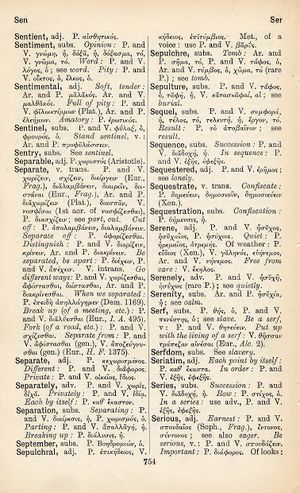series
οὐκ ἐπιλογιζόμενος ὅτι ἅμα μὲν ὀδύρῃ τὴν ἀναισθησίαν, ἅμα δὲ ἀλγεῖς ἐπὶ σήψεσι καὶ στερήσει τῶν ἡδέων, ὥσπερ εἰς ἕτερον ζῆν ἀποθανούμενος, ἀλλ᾿ οὐκ εἰς παντελῆ μεταβαλῶν ἀναισθησίαν καὶ τὴν αὐτὴν τῇ πρὸ τῆς γενέσεως → you do not consider that you are at one and the same time lamenting your want of sensation, and pained at the idea of your rotting away, and of being deprived of what is pleasant, as if you are to die and live in another state, and not to pass into insensibility complete, and the same as that before you were born
English > Greek (Woodhouse)
subs.
Succession: P. and V. διαδοχή, ἡ.
Row: P. στίχος, ὁ.
In a series: use adv., P. and V. ἑξῆς, ἐφεξῆς.
Latin > English (Lewis & Short)
sĕrĭes: (no
I gen. or dat.), em, ē, f. 2. sero, a row, succession, series; a chain of things fastened or holding together (syn. ordo).
I In gen.
A Lit. (mostly post - class.; not in Cic.); with gen.: series vinculorum, Curt. 3, 1, 17: structurae dentium, Plin. 7, 16, 15, § 70: sparsa ramorum, id. 11, 37, 69, § 182: longe porrecta viarum, Stat. S. 3, 3, 102: juvenum (in dancing), Tib. 1, 3, 63: omnis nepotum A Belo series, Sil. 1, 88: custodiarum, Suet. Calig. 27: prolixa series capillorum, App. M. 2, p. 118, 36.—Absol.: ferreae laminae serie inter se conexae, Curt. 4, 9, 3; 7, 3, 21.—
B Trop., a series, chain, connection, train, sequence, course, etc. (class., but for the most part only in the sing.).
(a) With gen.: continuatio seriesque rerum, Cic. N. D. 1, 4, 9: fatum est ordo seriesque causarum, id. Div. 1, 55, 125: fatum est sempiterna quaedam series rerum et catena, etc., Gell. 6, 2, 1: rerum sententiarumque, Cic. Leg. 1, 19, 52: tanta series artis est, id. Part. Or. 39, 137: in complexu loquendi serieque, Quint. 1, 5, 3: disputationum, Cic. de Or. 2, 16, 68: fati, Ov. M. 15, 152: immensa laborum, id. H. 9, 5: malorum, id. M. 4, 563: longissima rerum, Verg. A. 1, 641: fabularum, App. M. 1, p. 114, 19.—Of time (poet. and in post-Aug. prose): innumerabilis annorum, Hor. C. 3, 30, 5: temporis, Ov. Tr. 4, 10, 54: per longam saeculorum seriem, Tac. H. 1, 2: in tantā saeculorum serie, Just. 44, 2, 7: per tam longam seriem annorum, Col. 3, 10, 6; 4, 19, 1: cum omnis temporum series ex historiis colligatur, Lact. 4, 5, 8; 4, 10, 3.—Plur.: simulantes fictas litium, series, Vell. 2, 118: litium, Suet. Vesp. 10.—
(b) Absol., Quint. 5, 14, 32: cetera series deinde sequitur, majora nectens, ut haec: Si homo est, animal est, etc., Cic. Ac. 2, 7, 21: quae bene composita erunt, memoriam serie sua ducent, Quint. 11, 2, 39: haec erit aeternae series ab origine Romae, Aus. Epigr. 140, 2.—Of the connection of words: tantum series juncturaque pollet, Hor. A. P. 242.—
II In partic., an unbroken line of descent, lineage (poet. and in post-Aug. prose): ab Jove tertius Ajax. Nec tamen haec series in causā prosit, Ov. M. 13, 29: digne vir hac serie, id. P. 3, 2, 109: serie fulcite genus, Prop. 4 (5), 11, 69; Val. Max. 2, 7, 5.
Latin > French (Gaffiot 2016)
sĕrĭēs,¹¹ acc. em, abl. ē, f.,
1 file, suite, rangée, enchaînement [d’objets qui se tiennent] : Curt. 3, 1, 17 ; Plin. 7, 70 ; Tib. 1, 3, 63 || [fig.] series rerum sententiarumque Cic. Leg. 1, 52, suite, enchaînement de faits et de pensées, cf. Cic. Nat. 1, 9 ; Div. 1, 125 ; artis Cic. Part. 137, enchaînement des préceptes de la rhétorique ; abst] Cic. Ac. 2, 21 ; Hor. P. 242 ; Quint. 5, 14, 32
2 lignée des descendants, descendance : Ov. M. 13, 29 ; P. 3, 2, 109.

